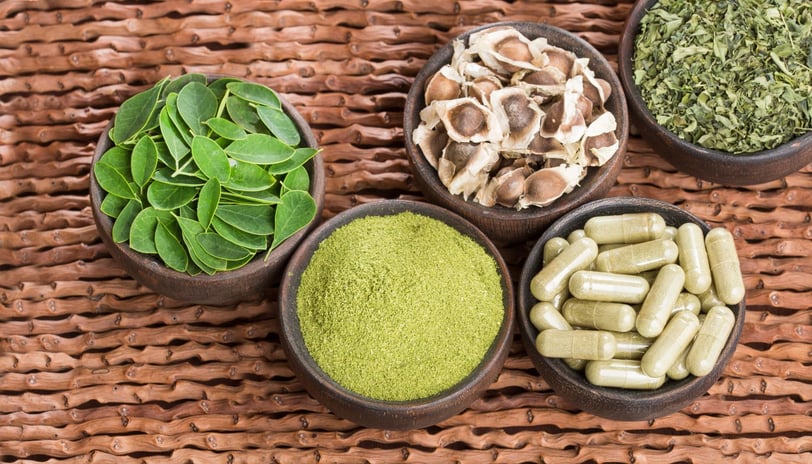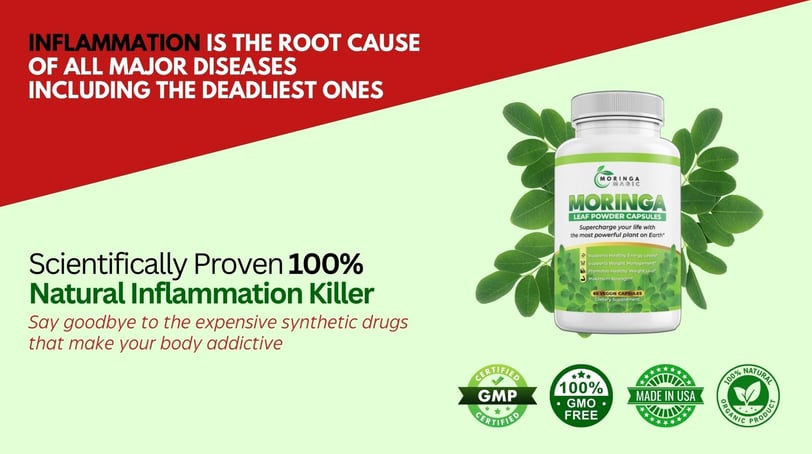The Most Surprising Health Benefits of Moringa
Discover the incredible health benefits of moringa, the "miracle tree." From managing blood sugar and reducing inflammation to boosting heart health, brain function, and skin vitality, explore why moringa is the ultimate superfood for your wellness journey.
11/28/20247 min read


The Most Surprising Health Benefits of Moringa
Introduction
In the world of natural remedies and superfoods, few plants have garnered as much acclaim as Moringa oleifera. Commonly referred to as the "drumstick tree," "miracle tree," or "tree of life," moringa has been a staple in traditional medicine for centuries. Its origins trace back to the foothills of the Himalayas in Northern India, where it was revered for its ability to treat over 300 ailments, according to ancient Ayurvedic texts. Today, moringa is cultivated worldwide, from Africa to Southeast Asia, and is celebrated for its unmatched nutritional density and myriad health benefits.
As a superfood, moringa has skyrocketed in popularity, appearing in powders, teas, oils, and capsules. But what makes this plant so extraordinary? The answer lies in its versatility and the surprising range of health benefits it offers. In this article, we’ll delve deep into the science behind moringa and uncover the most remarkable ways it can enhance your well-being.
Section 1: Nutritional Overview
Rich Nutritional Profile
Moringa's nutrient profile reads like the label of an advanced multivitamin. Virtually every part of the plant—leaves, pods, seeds, flowers, and even bark—is packed with essential nutrients. Among its most notable contributions to health are its abundance of:
Vitamin A: Essential for eye health, immune function, and cellular communication.
Vitamin C: A powerful antioxidant that boosts immunity, aids in wound healing, and supports collagen synthesis.
Vitamin E: Helps protect cells from oxidative stress and supports skin and hair health.
Calcium: Critical for strong bones and teeth, as well as muscle function and blood clotting.
Potassium: Plays a key role in heart health by regulating blood pressure and fluid balance.
Iron: Necessary for hemoglobin production and oxygen transport throughout the body.
Protein: Contains all nine essential amino acids, making it a rare complete protein source in the plant kingdom.
The nutritional density of moringa surpasses many conventional foods:
It has seven times more vitamin C than oranges, bolstering immunity and skin health.
It boasts ten times more vitamin A than carrots, making it a powerful ally for vision.
With 17 times more calcium than milk, it’s a plant-based alternative for those who are lactose intolerant.
It contains 15 times more potassium than bananas, supporting heart and muscle health.
Additionally, moringa is rich in fiber, which promotes digestive health and helps maintain a healthy gut microbiome. This combination of nutrients makes it a natural solution to combat malnutrition in developing countries and a valuable supplement for wellness enthusiasts.
Section 2: Antioxidant Powerhouse
High Antioxidant Content
Antioxidants are vital compounds that protect the body against free radicals, unstable molecules that can damage cells and contribute to aging and chronic diseases. Moringa is brimming with these protective compounds, including:
Quercetin: Known for its anti-inflammatory and antihypertensive properties, quercetin supports cardiovascular health.
Chlorogenic Acid: Found in coffee as well, this compound helps regulate blood sugar levels and enhances fat metabolism.
Beta-Carotene: Converts to vitamin A in the body, supporting eye health and immune function.
In a study comparing moringa leaves to popular vegetables, moringa demonstrated significantly higher antioxidant activity. This makes it a valuable ally in reducing oxidative stress, a key factor in conditions such as cancer, diabetes, and heart disease.
Research published in the Asian Pacific Journal of Cancer Prevention found that moringa leaf extract could significantly reduce markers of oxidative damage in cells. This positions moringa as one of the most potent plant-based sources of antioxidants, comparable to and often surpassing kale, spinach, and blueberries.
Section 3: Blood Sugar Regulation
Moringa's Role in Blood Sugar Control
Maintaining stable blood sugar levels is crucial for preventing and managing diabetes, a condition affecting millions worldwide. Moringa has shown promise in helping regulate blood sugar, thanks to its unique bioactive compounds. Studies suggest that moringa leaves can:
Reduce Blood Sugar Spikes: A study in Frontiers in Pharmacology demonstrated that moringa leaf powder lowered post-meal blood sugar levels in individuals with type 2 diabetes.
Improve Insulin Sensitivity: Moringa compounds stimulate pancreatic beta cells, which produce insulin, enhancing their efficiency.
Additionally, moringa's high fiber content slows carbohydrate absorption, preventing sudden spikes in blood sugar. This makes it a valuable dietary addition for those managing diabetes or prediabetes.
Section 4: Anti-Inflammatory Benefits
Reducing Inflammation
Inflammation is a natural response to injury or infection, but chronic inflammation can lead to conditions such as arthritis, heart disease, and autoimmune disorders. Moringa is rich in anti-inflammatory compounds like isothiocyanates and flavonoids, which can help reduce inflammation at its source.
A study published in the Journal of Medicinal Food found that moringa extract significantly reduced inflammation markers in both acute and chronic conditions. Its anti-inflammatory properties are particularly beneficial for:
Arthritis: Reducing joint pain and stiffness.
Heart Disease: Preventing the buildup of arterial plaques.
Digestive Disorders: Alleviating symptoms of colitis and irritable bowel syndrome (IBS).
By targeting the root causes of inflammation, moringa offers a natural way to manage and prevent chronic diseases.
Section 5: Heart Health Support
Cholesterol and Blood Pressure Management
Cardiovascular health is a pressing global concern, and moringa provides a natural way to support heart function. Research has shown that moringa can:
Lower LDL Cholesterol: High levels of "bad" cholesterol are a major risk factor for heart disease. Moringa’s antioxidants help reduce LDL levels while increasing HDL (good cholesterol).
Regulate Blood Pressure: Its high potassium content helps balance sodium levels in the body, reducing the strain on blood vessels.
Furthermore, moringa’s anti-inflammatory and antioxidant properties protect the heart by reducing oxidative stress and preventing arterial damage.
A study in the Journal of Ethnopharmacology confirmed these effects, showing that moringa supplementation improved lipid profiles and reduced blood pressure in participants.
Section 6: Cognitive Function Enhancement
Potential Benefits for Brain Health
As we age, cognitive decline becomes a growing concern. Moringa's nutrient profile makes it a potential ally in preserving brain function. Key compounds that contribute to this include:
Vitamins E and C: Combat oxidative stress in brain cells, which is linked to neurodegenerative diseases like Alzheimer’s.
Iron: Supports oxygen transport to the brain, enhancing focus and mental clarity.
Animal studies have demonstrated that moringa extract can improve memory and learning capacity. A study published in Oxidative Medicine and Cellular Longevity found that moringa's antioxidants could delay the progression of Alzheimer’s-like symptoms in experimental models.
While more human studies are needed, these findings suggest that moringa could play a role in supporting long-term cognitive health.
Section 7: Liver Protection
Protective Effects on the Liver
The liver plays a central role in detoxification, metabolism, and digestion. Moringa has been shown to protect this vital organ from damage caused by toxins, alcohol, and medications. Its high levels of polyphenols and flavonoids support liver health by:
Reducing Oxidative Stress: Protecting liver cells from damage caused by free radicals.
Lowering Liver Enzymes: Elevated enzyme levels often indicate liver damage or stress.
A study in Phytotherapy Research demonstrated that moringa extract could help repair liver tissue in animals exposed to toxic substances. This makes it a promising natural therapy for liver conditions and a valuable supplement for individuals with high exposure to environmental toxins.
Section 8: Skin and Hair Benefits
Nourishing Properties for Skin and Hair
Beyond its internal health benefits, moringa is a sought-after ingredient in beauty and personal care products. Its oil, derived from seeds, is rich in:
Fatty Acids: Moisturize and nourish the skin.
Antioxidants: Help combat signs of aging, such as wrinkles and fine lines.
Vitamin C: Boosts collagen production for firmer, more youthful skin.
Moringa oil is also used to promote hair health by strengthening hair follicles, reducing dandruff, and encouraging growth. Its versatility makes it an excellent choice for those seeking natural skincare and haircare solutions.


Section 9: Antibacterial and Antimicrobial Properties
Fighting Infections
Moringa’s antibacterial and antimicrobial properties have been recognized for centuries in traditional medicine. Scientific studies confirm its effectiveness against various pathogens, including:
Bacteria: Escherichia coli (E. coli), Salmonella, and Staphylococcus aureus.
Fungi: Candida species, which cause yeast infections.
Viruses: Limited studies suggest antiviral potential.
These properties make moringa a valuable tool in wound healing, infection prevention, and even food preservation. Its natural efficacy offers an alternative to synthetic antibiotics, especially in regions where access to medication is limited.
Section 10: Weight Management Aid
Supporting Healthy Weight Loss
Moringa's role in weight management is gaining traction, thanks to its metabolism-boosting and fat-burning properties. Key factors include:
Fiber: Promotes satiety, reducing overeating and cravings.
Chlorogenic Acid: Enhances fat metabolism and prevents fat storage.
Low-Calorie Content: Provides essential nutrients without adding excessive calories.
A study in the Journal of Ethnopharmacology found that moringa supplementation led to significant reductions in body weight and fat mass in overweight individuals. When combined with a balanced diet and exercise, moringa can be a valuable part of a weight loss regimen.
Conclusion
Moringa’s nickname as the “miracle tree” is well-deserved. Its rich nutritional profile, coupled with its powerful medicinal properties, makes it a versatile and valuable addition to any diet or wellness routine. From supporting heart health and managing diabetes to enhancing brain function and promoting glowing skin, moringa offers benefits that span nearly every aspect of health.
Incorporating moringa into your daily life can be as simple as adding its powder to smoothies, brewing its leaves into tea, or using its oil in your skincare routine. As research continues to unveil even more benefits, moringa stands out as a timeless remedy for modern health challenges.
Have you tried moringa? Share your experiences or favorite recipes featuring this incredible superfood in the comments below!
Why Moringa Matters
Moringa isn’t just a superfood; it’s a smart tool in our quest for global health, wrapped in environmental and social consciousness. As more research unfolds, the full extent of moringa’s benefits is becoming clear. Prepare to unlock the secrets of ultimate wellness with moringa—it’s your gateway to a healthier, more vibrant life! LEARN MORE HERE >>>


